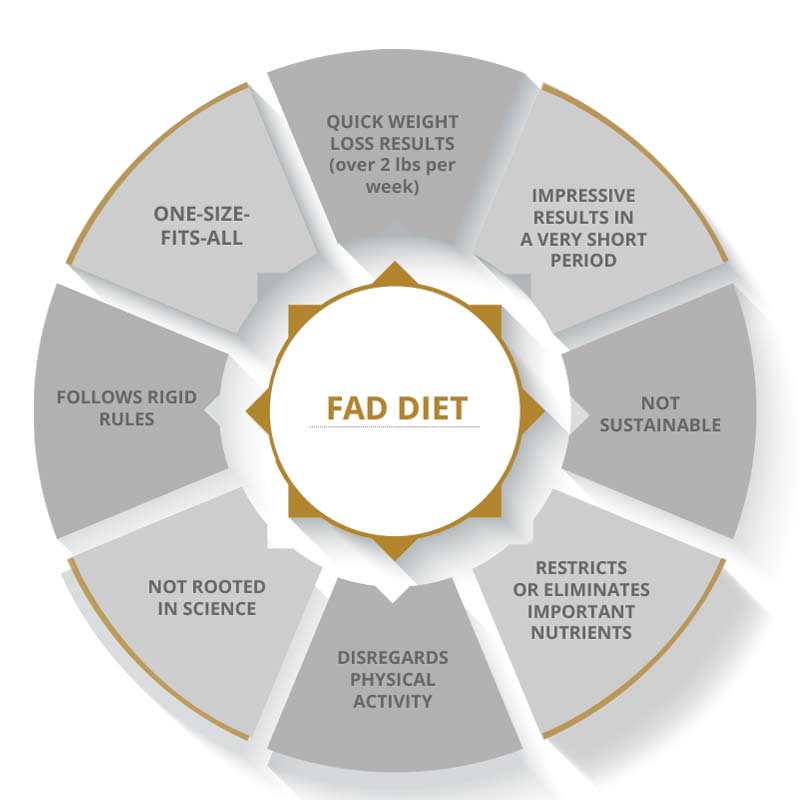In theory, losing weight sounds easy. However, practice shows it’s a long, challenging journey requiring patience and the right mindset. Most people who try shortcuts or fad diets may experience some short-term weight loss but ultimately fail in the long run and may even cause themselves harm.
This article explains what a fad diet is, how to recognize one, and why it doesn’t yield satisfactory results. It also recommends healthier, sustainable weight loss solutions.

A fad diet is a trendy, one-size-fits-all eating plan that promises significant and quick weight loss but bypasses the essential prerequisite of sustained weight loss: the modification of lifestyle habits, such as physical activity, sleep patterns, and stress levels.
Fad diets are not backed by science, or they take certain data from a scientific study and draw exaggerated, flawed conclusions. People are drawn to them because they want to see results quickly without too much effort.
The marketing behind fad diets is strong and often manipulative, with celebrities, influencers, and big companies promoting foods and products claiming miraculous results.
Fad diets can be grouped into different categories based on several factors:
Sometimes it can be difficult to differentiate a fad diet from a healthy eating plan. Nutritionists explain that a fad diet typically promises quick, unsustainable results – such as shedding over two pounds per week or losing weight while lying on a couch and eating chips. They don’t consider a patient’s unique physical and psychological features.
The following graphic summarizes the attributes of the most common fad diets.

Some of the most popular fad diets that have appeared in the past decades include:
Many fad diets restrict the intake of important minerals and vitamins, which can lead to various health issues, including:
Note: Is there a correlation between anemia and weight? Find out if anemia causes weight loss or is hindering your efforts.
Healthy, long-term weight loss requires lifelong adherence to changes in one’s diet and other lifestyle modifications.
Health professionals advise adopting the following eating habits:
Note: Looking for meal ideas that are healthy and satiating but low in calories? Check out our sustainable 7-day meal plan for weight loss.
Other important lifestyle habits that contribute to a healthy weight include:
People who struggle to lose weight with diet and exercise can get help from medical professionals. Medical weight loss programs are treatment plans tailored for each patient that typically involve a customized nutrition plan, targeted exercises, medications (such as chromium, metformin, semaglutide, or low-dose naltrexone), appetite-suppressing supplements, IV therapy, and counseling.
Note: Discover the benefits of IV therapy for weight loss.
The following questions and answers summarize what you’ve learned about fad diets. They will help you avoid one and only choose eating plans that bring about gradual, lifelong changes to your physique and wellbeing.
A fad diet is any eating plan that promises results that are “too good to be true”, and is usually restrictive. Medical professionals don’t endorse fad diets and consider most of them harmful to long-term health.
Fad diets are bad because they lead to nutritional deficiencies, potentially causing severe health issues.
The most common forms of fad diets are low-calorie and low-carb diets.
The keto diet is an example of a popular fad diet. It’s based on consuming high-fat and high-protein food. The purpose of the keto diet is to deprive the body of glucose found in carbohydrates in order to reach ketosis – the state in which the body uses fat instead of glucose for energy.
Medical professionals prescribe this diet to patients with epilepsy, diabetes, and other diagnosed conditions. However, when used without medical supervision, it can lead to nutritional deficiencies and cause more harm than good.
Note: Research shows that insulin and weight loss are directly connected. Find out how chronically elevated insulin levels can inhibit normal metabolic processes and weight loss efforts by reading our post: Insulin Resistance and Weight Loss.
Lured by the promise of rapid weight loss, millions of people have tried a fad diet at least once – and failed to maintain the results. Unfortunately, fad diets remain popular despite their well-known shortcomings thanks to our human desire for quick fixes, social media influencers and the unattainable beauty standards they promote.
Remember that the safest and healthiest way to go about reducing body fat is medically supervised weight loss.
If you need help with weight loss and weight management, our friendly medical team will gladly assist you on your weight loss journey.
In the meantime, learn how to start your weight loss journey. We've compiled a list of 12 best practices to help you jumpstart weight loss and learn how to maintain your results in the long run.




4325 E Indian School Rd, Suite 130
Phoenix, AZ 85018
United States
(480) 422-2058
info@vibrantvitalityclinic.com
Monday - Friday: 9:00 am - 6:00 pm
Saturday: 9:00 am - 3:00 pm
Sunday: Closed
